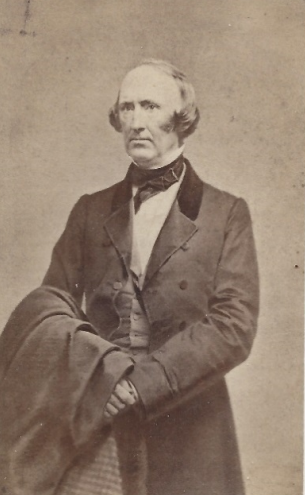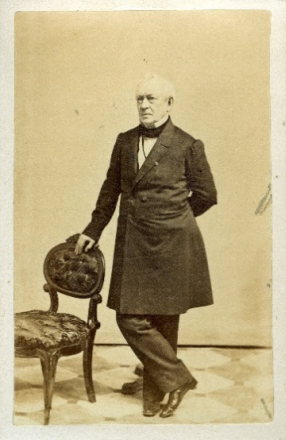Section #20 - Futile attempts to save the Union follow John Brown’s Raid at Harpers Ferry
Chapter 244: Many Northerners Come To Regard Brown As A Martyr
October 1859
Initial Northern Opinions Of Brown Are Uniformly Critical
Contrary to Ruffin’s wishes, the immediate response to John Brown and Harpers Ferry in the North is much like that in the South.
Press coverage is almost uniformly opposed to the raid.
The New York Evening Post says that Brown was “driven to madness” by his actions in Kansas, and Harpers Ferry was the tragic result. The Chicago Press and Tribune writes that no one could “approve the (raider’s) means or justify their ends.” Even the abolitionist editor, Horace Greeley, initially calls it “the work of a mad man.”
The Northern politicians follow suit in condemning the act.
Even the abolitionists concur. John Hale “deeply regrets” the raid; Salmon Chase sees it as “an insane attempt;” Ben Wade says “it is absurd to implicate the Republican Party in the acts of John Brown.”
Lincoln says that the raid is “wrong for two reasons…a violation of law and…futile as far as any effect it might have on the extinction of a great evil.”
Fingers are pointed at those suspected of supporting the raid.
New York Senator Henry Seward legitimately denies any role in the plot. Ohio Governor Joshua Giddings, who has had frequent contact with Brown, responds deceptively, that “Brown never consulted me.”
Even Brown’s closest backers, members of the Secret Six, distance themselves after a large cache of their incriminating correspondence with him is uncovered at the Kennedy Farm. Gerrit Smith suffers a nervous breakdown and enters an insane asylum, while Parker remains in Italy and Stearns, Sanborn, and Howe flee to Canada, soon to be followed by Frederick Douglas.
Only the Unitarian Minister, Thomas Higginson, Brown’s staunchest loyalist among the Secret Six, stands alone in Boston to defend his attack on slavery.
But, soon enough other voices join in.
November 8, 1859
The Transcendentalists Mount A Defense Of Brown
The critical group coming to Brown’s defense are the New England Transcendentalists, who have been introduced to him by Theodore Parker during his January 1857 visit to the “Secret Six.”
At that time, he strikes them as an example of their “ideal American,” the morally upright and self-reliant man, living amidst nature’s bounty, making his way as a farmer. His purpose in opposing slavery is just and his determination admirable.
The pro-Brown campaign is led by Ralph Waldo Emerson, America’s leading intellectual, whose mastery of the spoken and written word have defined the public’s notion of heroism for over two decades.
On November 8, 1859, twenty-four days before Brown is hanged in Virginia, Emerson delivers a lecture at the Music Hall in Boston that causes many Northerners to begin to imagine him in a different light.
Emerson’s topic is a familiar one, articulating the “qualities which conspicuously attract the wonder and reverence of mankind.” He explores three in particular: “selflessness, practicality and courage.” The third quality, “courage,” takes him to a prior conversation he has had with Brown.
Captain John Brown, the hero of Kansas, said to me that ”for a settler in a new country, one good, believing, strong-minded man is worth a hundred, nay, a thousand men without character, and that the right men will give a permanent direction to the fortunes of a state.”
He goes on, referencing the reported exchanges between Virginia Governor Henry Wise and his captive:
The true temper has genial influences. It makes a bond of union between enemies. Governor Wise of Virginia, in the record of his first interviews with his prisoner…distinguishes John Brown. As they confer, they understand each other swiftly; each respects the other. If opportunity allowed, they would prefer each other’s society and desert their former companions.
John Brown is no madman, according to Emerson. Instead a successor to “the best of those who stood at our bridge on Lexington Common” – ready to sacrifice himself in service to a higher law.
From there comes another Emerson line that will register alongside “the shot heard round the world.” It refers to Brown as…
That new saint than whom none purer or more brave was ever led by love of men into conflict and death,—the new saint awaiting his martyrdom, and who, if he shall suffer, will make the gallows glorious like the cross.
This comparison of Brown on the gallows to Christ on the cross will shower Emerson with opprobrium from his critics – but also cause others to find justification for his actions.
December 2, 1859
His Execution Is Mourned In Many Northern Cities

As John Brown’s execution date approaches, supporters frame a variety of plots for a last minute rescue — but in addition to being impractical, he signals his intent to die a martyr to his cause.
What’s left then are various forms of protests, small and large.
At 11am on December 2, as he stands on the gallows, church bells are rung in towns and cities across the North and West in support of his suffering. Memorial events follow.
A large gathering at Tremont Hall in Boston listens to praise for him from Wendell Phillips and from William Lloyd Garrison, who finally acknowledges that insurrections may be needed to abolish slavery.
I am prepared to say: success to every slave insurrection at the South and in every slave country.
Cleveland’s Melodeon Hall is decked out in black crepe for over a thousand mourners, under a banner claiming: JOHN BROWN, The HERO of 1859.
A speaker at an assembly in Rhode Island proclaims that…
In his strong love for freedom, in his heroic spirit, in his fidelity to his convictions (we see) a noble spirit.
Nowhere is reverence for John Brown greater than in the free black communities of the North.
Special praise for him comes from Charles Henry Langston, born in Virginia to a white planter and his black common law wife, educated at Oberlin College, and a founder of the Ohio Anti Slavery Society. Langston asks his audience “why should I honor the memory or mourn the death of any of the white people of this land?” He answers his own question, in praise of John Brown:
A lover of mankind – not of any particular class or color, but of all men…He fully, really and actively believed in the equality and brotherhood of man…He alone has lived up to the Declaration of Independence…He admired Nat Turner as well as George Washington.
Other Northern remembrances of John Brown and Harpers Ferry are tinged with animosity toward the South.
In Connecticut, Virginia Governor John Wise is hanged in effigy.
Then in Boston, there is the English born journalist, James Redpath, who uses Harpers Ferry to continue his vitriolic attacks on the South. Redpath’s reporting on Brown goes back to Kansas, where he interviews him soon after the Pottawatomie Massacre, and he will go on to publish a favorable biography of him in 1860. But for the moment he is happy to sing his praises as the warrior whose actions reveal the cowardice of the South.
Never before, among modern nations, did seventeen men produce so terribly and universally a panic as Old Brown at Harpers Ferry….Everyone believed the South to be full of fighting pluck until Brown demonstrated that she was only a cowardly braggart after all.
December 1859
The Praise For Brown Draws Heated Opposition
Southerners of course are angered by the show of Yankee sympathy for Brown, but they are not alone in this regard.
They are joined by Northern conservatives who are fiercely dedicated to saving the Union and regard both Harpers Ferry and the Republican Party as threats to this outcome.
Notable among this group are two Massachusetts men, the Whig, Edward Everett, an ex-Senator, Governor and Secretary of State, and the Democrat, Caleb Cushing, Attorney general under Franklin Pierce.
Everett lashes out against Emerson, his former student at Harvard, for blasphemy, and likens Brown’s plan as akin to the devastation caused by the 1791 black revolution in Santo Domingo.
Cushing reminds listeners of the “merciless heart” exhibited by Brown at the Pottawatomie Massacre, and adds a dire prediction:
This is the commencement of Civil War in the United States.

A so-called “Anti-Brown Rally” draws almost 6,000 people to the Academy of Music Hall in New York City on December 19, 1859. It praises negro slavery as “decreed by nature” and labels those who support Brown as…
Disgraces to a Christian age and country.
Letters to this effect are read out to the crowd from Presidents Martin Van Buren, Millard Fillmore and Franklin Pierce, along with former candidate, General Winfield Scott.
A comparable event is held in Philadelphia, marked by large banners declaring:
Down with all Traitors, Factionists and Disunionists!
Soon enough these sentiments will translate into another political entity known as the Constitutional Unionist Party.
It will comprise a diverse combination of Northerners and Border State Southerners, with roots in the Whig and Democrat parties, united around one paramount end – to save the Union.
December 1859 Forward
Northern Public Opinion Gradually Tips In Favor Of Brown
While few Northerners accept the notion of sainthood for John Brown, a sizable number conclude that his actions were in many ways understandable, even heroic and long overdue.
This group is largely made up of those angered by the South’s efforts to “nationalize slavery” and force them into sharing a strictly sectional problem.
Their antagonism toward the South has been building for decades.
It is heightened by the 1850 Fugitive Slave Act, the presence of bounty hunters in local towns, and the intrusive demands that citizens help capture run-aways. Then comes the 1854 Kansas-Nebraska Bill, reneging on the 36’30” line of demarcation and opening up the Louisiana acreage to the wealthy Southern planters. Followed by the bullying tactics by the Missouri Ruffians in the 1856 Kansas elections, the caning of Charles Sumner, and the shameful attempts by Buchanan to ram the pro-slavery Lecompton Constitution through congress, negating the will of the voters.
This ends with a sense of “enough is enough.”
If the South insists on continuing to have slaves, that is their problem – but they have no right to force it on the rest of the nation. To do so reflects a form of arrogance that needs to be slapped down once and for all.
For them, Harpers Ferry is the kind of bloody nose the South deserves – with John Brown as the necessary messenger. While never the Christ-like figure conjured up by Emerson, he becomes:
The right-minded vigilante, exercising frontier justice on his own, to strike out against the wrong-doers in the name of essential justice.